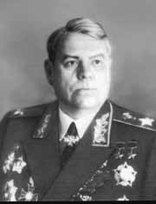Aleksandr Vasilevsky (30 Sep. 1895 - 5 Dec. 1977)

Vasilevsky served on the General Staff when Germany invaded the Soviet Union and in August 1941 was appointed the Chief of the Operations Directorate of, and Deputy Chief of, the General Staff. He was despatched to the Western Front to oversee proceedings in October and coordinated the fronts that were defending Moscow. In that month he was promoted to Lieutenant General, and he served in Moscow when all other members of the Stavka (General Staff) had evacuated.
He coordinated the further counterattacks from Moscow and in April 1942 he became acting Chief of Staff, being promoted to Colonel General. He commanded Soviet forces in the disastrous Second Battle of Kharkov. After this he would serve at Leningrad before becoming Chief of the General Staff in June 1942 and later Deputy Minister of Defence in October. He was later sent to Stalingrad with Zhukov and would coordinate the double pincer attack that defeated the German army.
He would later become General of the Army in January 1943 and in February, Marshal of the Soviet Union. He coordinated the Battle of Kursk, then fought German forces in the Crimea. He would further coordinate attacks in Ukraine, Belarus, the Baltics and Königsberg.
After German defeat, he would become Commander-in-Chief of Soviet Forces in the Far East, successfully leading Soviet attacks on Japanese forces in Manchuria.
For more information on Aleksandr Vasilevsky:
Shtemenko, S.M. 2nd edn. The General Staff during the war (Moscow: Voenizdat), 1989.
Vasilevsky, A.M. The matter of my whole life (Moscow: Veche), 2000.
Zalessky, K.A. Stalin’s Empire (Moscow: Veche), 2000.
He coordinated the further counterattacks from Moscow and in April 1942 he became acting Chief of Staff, being promoted to Colonel General. He commanded Soviet forces in the disastrous Second Battle of Kharkov. After this he would serve at Leningrad before becoming Chief of the General Staff in June 1942 and later Deputy Minister of Defence in October. He was later sent to Stalingrad with Zhukov and would coordinate the double pincer attack that defeated the German army.
He would later become General of the Army in January 1943 and in February, Marshal of the Soviet Union. He coordinated the Battle of Kursk, then fought German forces in the Crimea. He would further coordinate attacks in Ukraine, Belarus, the Baltics and Königsberg.
After German defeat, he would become Commander-in-Chief of Soviet Forces in the Far East, successfully leading Soviet attacks on Japanese forces in Manchuria.
For more information on Aleksandr Vasilevsky:
Shtemenko, S.M. 2nd edn. The General Staff during the war (Moscow: Voenizdat), 1989.
Vasilevsky, A.M. The matter of my whole life (Moscow: Veche), 2000.
Zalessky, K.A. Stalin’s Empire (Moscow: Veche), 2000.

